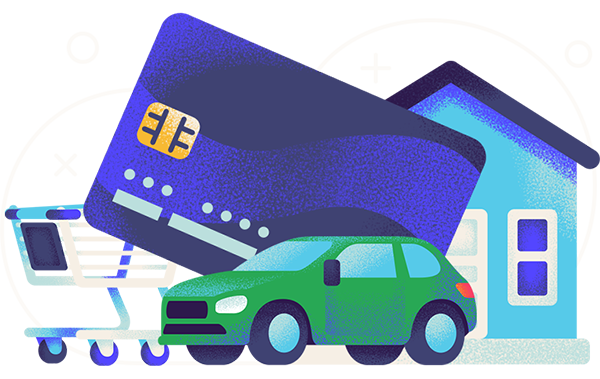You should use your credit card for nearly everything you can, including everyday purchases, travel, dining, online shopping, and subscription/membership fees. It’s good to use your credit card for most purchases because credit cards help you build credit, save money with rewards, and stay safe from fraud.
Despite the benefits, there are still a few cases where using a credit card is not the best idea, like if the transaction will cost you more in fees than you earn in rewards. You can learn more about when to use and not use a credit card below.
Reasons to Use a Credit Card for Everything
- It allows you to build credit. Every month, your credit card issuer will report information about your account, including your balance and payment status, to the credit bureaus. If you use your card responsibly by paying the bill on time every month and keeping your credit utilization low, your credit score should improve.
- Fraud is easier to handle on a credit card. You aren’t responsible for paying for any unauthorized charges on your card, and you are more immediately protected because money doesn’t leave your bank account until you pay your bill. So, you have time to notice and dispute the fraudulent charges before paying for them. On the other hand, unauthorized charges on a debit card have usually cleared by the time you notice them, so the bank has to investigate the claim and get your money back before the stolen money can be returned to your bank account.
- You could save extra by earning rewards. Rewards credit cards typically return a percentage of your purchases to you in the form of cash back, miles, or points. Lots of rewards credit cards have generous signup bonus offers for new cardholders, too. These give a certain amount of points, cash back, or miles as a one-time bonus for meeting a spending threshold in the first few months after opening an account. If you were already going to spend that amount of money anyway, you may as well get a big bonus for it.
- You can borrow money interest-free. The time you’re given to pay for a credit card purchase – i.e. the rest of the billing cycle plus the grace period – can cut you some slack on cash flow from month to month. In other words, you don’t need to have all the money in your bank account before you make your purchases. As long as you pay the bill in full by the due date, you won’t owe any interest on your purchases and you will keep the grace period.
- Credit cards have other worthwhile benefits. Some credit cards offer additional consumer protections, such as travel insurance or reimbursement for items that break, experience a price decrease after you buy them, or can’t be returned to the merchant.
Downsides of Using Credit Cards for Everything
- The potential to spend beyond your means. Budgeting can easily take a backseat when you’re using a credit card, and it’s possible that you’ll spend more than you can afford to quickly repay, leading to expensive finance charges. Paying interest on a credit card balance will usually negate any rewards you’ve accumulated, and then some, given the high ongoing interest rates that credit cards tend to charge. That’s why it’s important for you to pay off the balance on time every month when using a credit card for everyday purchases.On the other hand, if you have a credit card with a 0% APR period, you can use it strategically to finance specific big-ticket purchases or reduce the cost of existing debt. Keep in mind that you should aim to pay off your entire balance before the promotional period ends, because anything remaining will be subject to the regular APR. You can use a credit card payoff calculator to help you plan things out.
- Extra fees. In some cases, such as at a gas station, a merchant will charge an extra fee for using a credit card. If the fee outweighs any potential rewards you’d earn, then it’s not worth it to use your card.In addition, some credit cards charge foreign transaction fees, so it’s not a good idea to use that type of credit card abroad. Thankfully, there are plenty of cards with $0 foreign transaction fees.Finally, some credit cards charge annual fees, which can end up being too expensive if you don’t earn more in rewards than you pay to keep the card open. Many cards have $0 annual fees, though.
- Credit score impact. While responsible credit card use can help build and improve your credit score, mismanagement of credit cards can have a negative impact on your credit. Late payments, high credit card balances relative to your credit limit (high credit utilization), and opening too many credit accounts can all harm your credit score.Keeping a close eye on your credit utilization is especially important when you tend to use a credit card for most purchases. If your balance at the end of your billing cycle equals more than 30% of your credit limit, your credit score may go down. Anything under that is okay, but 1% to 10% is actually the most ideal percentage for building credit. If you use your credit card for everything you buy, you may exceed that, but you can keep your utilization in check by making multiple payments each month.
Things You Should NOT Use Your Credit Card For
Cash Advances: You should avoid using your credit card to withdraw cash from an ATM or bank teller. Cash advances come with high fees and start accruing interest immediately, usually at a higher APR than regular purchases.
Financing purchases or balance transfers outside of a 0% APR: Many credit cards offer you an introductory 0% APR on purchases or balance transfers. But after that, carrying a balance from month to month is very expensive, with the average new credit card charging 22.76%. Interest can quickly add up and become unsustainable.
Purchases that will incur an extra fee: Several types of transactions will charge you more for using a credit card. If you can earn more in rewards than you pay in fees, using a credit card can still be worth it in some cases, but be on the lookout for these types of situations:
- Merchants that raise the price for credit cards: Gas stations are a good example of this.
- Purchases you can’t normally use credit cards for: Using a credit card for mortgage, rent or loan payments, for example, may require the use of a third-party service that charges extra fees.
- Transactions that are treated like cash advances: Money transfer apps treat certain credit card transactions – like sending money directly to friends and family – as cash advances, so you should avoid them due to high APRs and cash advance fees.
Learn more about what to use a credit card for.


WalletHub experts are widely quoted. Contact our media team to schedule an interview.